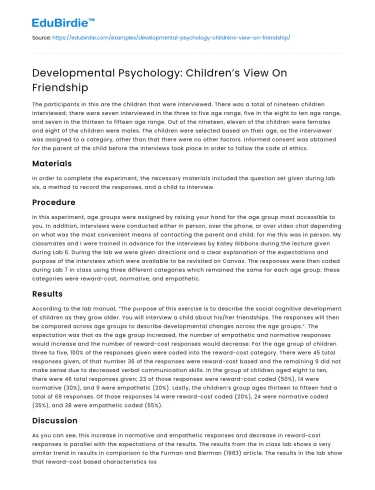The participants in this are the children that were interviewed. There was a total of nineteen children interviewed; there were seven interviewed in the three to five age range, five in the eight to ten age range, and seven in the thirteen to fifteen age range. Out of the nineteen, eleven of the children were females and eight of the children were males. The children were selected based on their age, as the interviewer was assigned to a category, other than that there were no other factors. Informed consent was obtained for the parent of the child before the interviews took place in order to follow the code of ethics.
Materials
In order to complete the experiment, the necessary materials included the question set given during lab six, a method to record the responses, and a child to interview.
Save your time!
We can take care of your essay
- Proper editing and formatting
- Free revision, title page, and bibliography
- Flexible prices and money-back guarantee
Procedure
In this experiment, age groups were assigned by raising your hand for the age group most accessible to you. In addition, interviews were conducted either in person, over the phone, or over video chat depending on what was the most convenient means of contacting the parent and child; for me this was in person. My classmates and I were trained in advance for the interviews by Katey Gibbons during the lecture given during Lab 6. During the lab we were given directions and a clear explanation of the expectations and purpose of the interviews which were available to be revisited on Canvas. The responses were then coded during Lab 7 in class using three different categories which remained the same for each age group; these categories were reward-cost, normative, and empathetic.
Results
According to the lab manual, “The purpose of this exercise is to describe the social cognitive development of children as they grow older. You will interview a child about his/her friendships. The responses will then be compared across age groups to describe developmental changes across the age groups.”. The expectation was that as the age group increased, the number of empathetic and normative responses would increase and the number of reward-cost responses would decrease. For the age group of children three to five, 100% of the responses given were coded into the reward-cost category. There were 45 total responses given, of that number 36 of the responses were reward-cost based and the remaining 9 did not make sense due to decreased verbal communication skills. In the group of children aged eight to ten, there were 46 total responses given; 23 of those responses were reward-cost coded (50%), 14 were normative (30%), and 9 were empathetic (20%). Lastly, the children’s group ages thirteen to fifteen had a total of 69 responses. Of those responses 14 were reward-cost coded (20%), 24 were normative coded (35%), and 38 were empathetic coded (55%).
Discussion
As you can see, this increase in normative and empathetic responses and decrease in reward-cost responses is parallel with the expectations of the results. The results from the in class lab shows a very similar trend in results in comparison to the Furman and Bierman (1983) article. The results in the lab show that reward-cost based characteristics lost importance whereas normative and empathetic characteristics gained importance to children as age increased. This is aligned with the results from Furman and Bierman (1983); Compared to the younger children, the older ones place greater emphasis on the affective or motivational aspects of friendly behaviors. That is, although helping and sharing refer to specific actions, they imply prosocial intentions and positive affect. The developmental decreases which were observed on the feature of physical characteristics are also consistent with this explanation. Once the children begin to emphasize the significance of affectively based expectations, their conceptions become more refined and the expectations concerning physical characteristics become superfluous.”. It would be accurate to infer after viewing both of these experiments that as age increases, abstract thinking and reasoning increases. A way to improve the study would be to use the same number of children in each age group as well as divide the children by gender and age in order to examine the results more closely.
References
- Furman, W & Bierman, K. (1983). Developmental Changes in Young Children’s Conceptions of Friendship, 7.






 Stuck on your essay?
Stuck on your essay?

